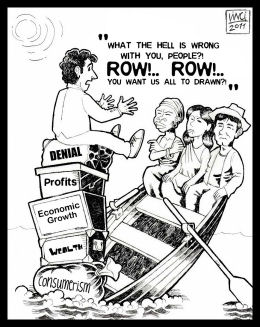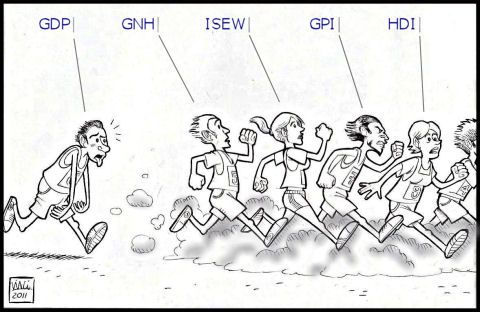But is it really necessary to continue to grow?
Imagine living in a country where everyone, absolutely everyone, has a house, maybe nothing sensational but in proportion to the needs of his/her family. Imagine also that everyone in that country, men and women, has a job with good pay, even here nothing stratospheric but sufficient to ensure a dignified life, two meals a day, a holiday of 15 days in the summer, some small recreation such as the gym or a painting course. No excess, no insanity, no villa with swimming pool or yacht in some harbor, at most a barbeque to have a grill with friends on the weekend.

In the same boat
[Illustration by Vincenzo Cardona Albini]
Would you like to live in a country like that? Let us say, yes…
Let us now imagine that everything remains stable, that is, that no one becomes much richer or much poorer. Maybe someone who is better or deserves more, will have something more than others, but only because he is giving to society more than the others, a “more” that is tangible, measurable, assessable. Therefore, not a flattening down but a decent life for everybody plus an opportunity for the experts to have more, but always in proportion to their quality and their contribution to society.
Would you like to still live in a country like that? Let us say again, yes…
Well, are you aware that a country like that one could virtually have zero growth? Not a two-digit and not even a one-digit growth, but a flat, really flat growth, or at least associated with the growth in population to avoid becoming a country of old people. Obviously it would be a country where the longer people live, the more people remain productive in the workforce despite their increasing age. However not in a stressful and oriented-to- succeed-at-any-cost system, but in one in which people work for their satisfaction and to give a real contribution to society, while ensuring a certain amount of time for relationships and affections, for family and friends, and why not, for themselves.
Therefore we are imagining a country where everybody works a bit less each month, but a little more over a lifetime, enough to secure a peaceful life without too many concerns other than those that sometimes life inevitably imposes. I’m not talking about a utopian country where no one ever gets sick, does not suffer, does not betray or hurt each other or where violence or crime is not present at all. I’m talking about a plausible country where people decided to replace the ideal of continuous growth, the need to measure ourselves in terms of GDP, just to be clear, with other parameters that are perhaps less focused on continuing to increase our wealth but rather to manage and distribute it in a better way.
I am not speaking of an ideal of complete flattening, in which merit is not recognized and opportunities to earn something more are denied. Quite the contrary: each individual can surely grow but always in proportion to his or her contribution to society and therefore in a sustainable manner, that is, without severely depleting someone else. Of course there will always be those who want to try to be clever and assure him/herself something without doing anything but, at this point, such behavior should be ostracized and possibly punished, because in a society like the one I described, each must do his part, otherwise it does not work.

Gross Domestic Product (GDP)
Gross National Happiness (GNH)
Index of Sustainable Economic Welfare (ISEW)
Genuine progress indicator (GPI)
Human development index (HDI)
[Illustration by Vincenzo Cardona Albini]
For the rest, complete freedom: do you want to be a painter or musician? If you’re good, you earn a living and keep yourself. Do you want to be an engineer or an architect, a researcher or a bricklayer? No problem. Of course, the greater the responsibility and the complexity of your work, the greater will be the economic return. No scandal if a qualified surgeon who spent 12 years studying to earn a degree, a specialization, and for training and that always has to remain up-to-date while working, may gain more than an unskilled bricklayer who, as good as he is, doesn’t have the know-how and the responsibilities of a doctor. It does not mean that the work of a bricklayer has no dignity, anyway, even because builders are sometimes true artists rather than just simple laborers.
So neither the free market nor the right of individuals to choose what they can do with their lives are called into question, but the principles on which to base a robust and sustainable economic system, since the current one is not and it is proving that. The problem is in fact physiological: we cannot seriously think that we can grow indefinitely in a system where resources are finite. As emerging countries begin to consume resources at the same pace and in the same manner with which we consume them today, resources will begin to run out quickly for everyone. Of course, those who can, who are stronger, richer and have more resources at home will last a little longer than others, and then sink like the rest of the planet. We need to change before this happens, because if we don’t, the recovery will be more difficult and will require higher costs, even in terms of lives.
The present is not the only plausible economic system: globalization is defining its limits, limits that it always had but that locally, in the various rich countries, were less or not at all noticeable in the past. Now we have reached a point of no return and we must decide whether to go ahead on a slippery slope or stop and change our attitude. This will determine whether our civilization will evolve or if we simply collapse, as happened to so many empires in the past, with the difference that this time the collapse will be global and possibly mark the end of civilization as we know it.
Translation reviewed by Gregory Cifelli — any remaining error is due to the author.




















Sempre pensato che non ha senso parlare di crescita infinita in un pianeta dalle risorse finite. In questo libro “prepariamoci” di L. Mercalli ho trovato tanti interessanti parametri oggettivi che confermano questo modello.
Sono d’accordo su quasi tutto, sicuramente il modello di società occidentale mostra i suoi limiti, che però sono principalmente dovuti alla corruzione/collusione delle persone che ci governano e che hanno dato l’impronta alla nostra società al fine di favorire gli interessi di pochi (loro sostenitori) a scapito di molti sempre più sfruttati.
Speriamo che si riesca a fermare il mondo e a dargli un’altra direzione, ma potrebbe sembrare un po’ utopico detto così come lo hai esposto nel tuo articolo. Forse le crisi regressive, anche dal punto di vista culturale e civile, servono a mettere tutti di fronte ai veri problemi dell’esistenza (in modo traumatico) e suscitare in tutti un moto di rinascita.
Pierangelo